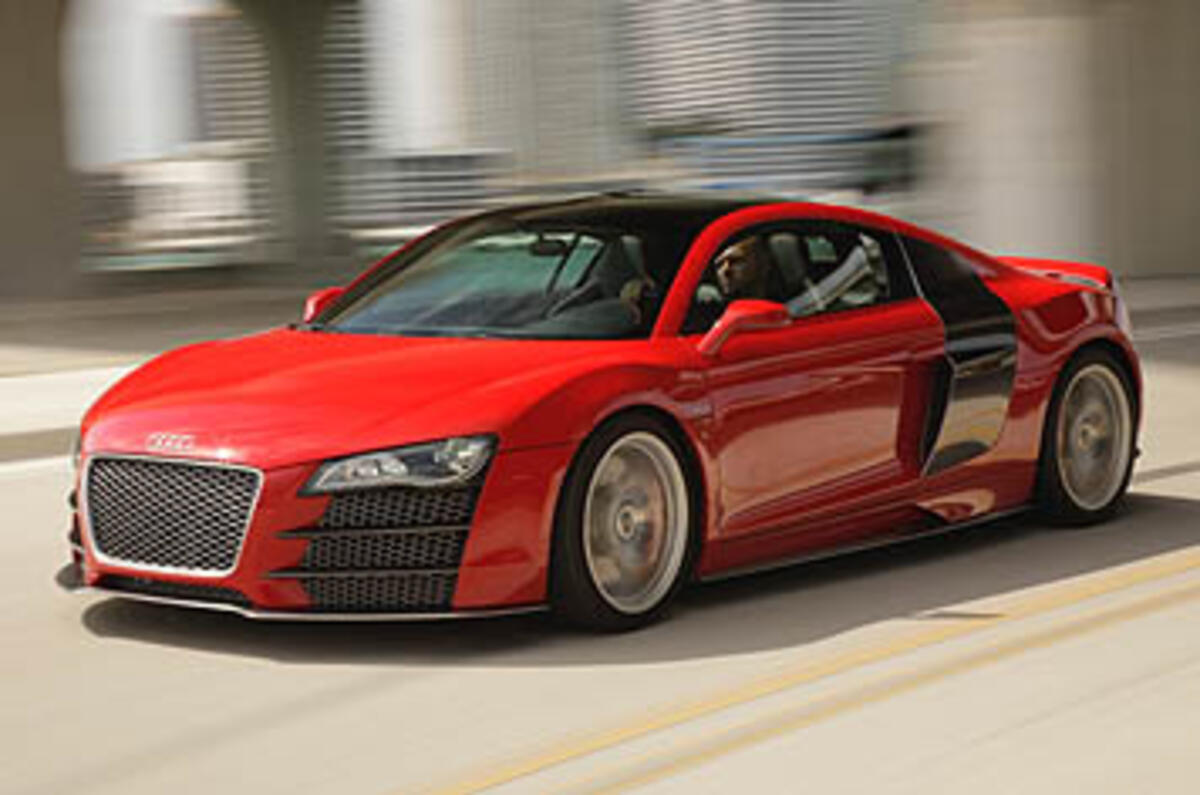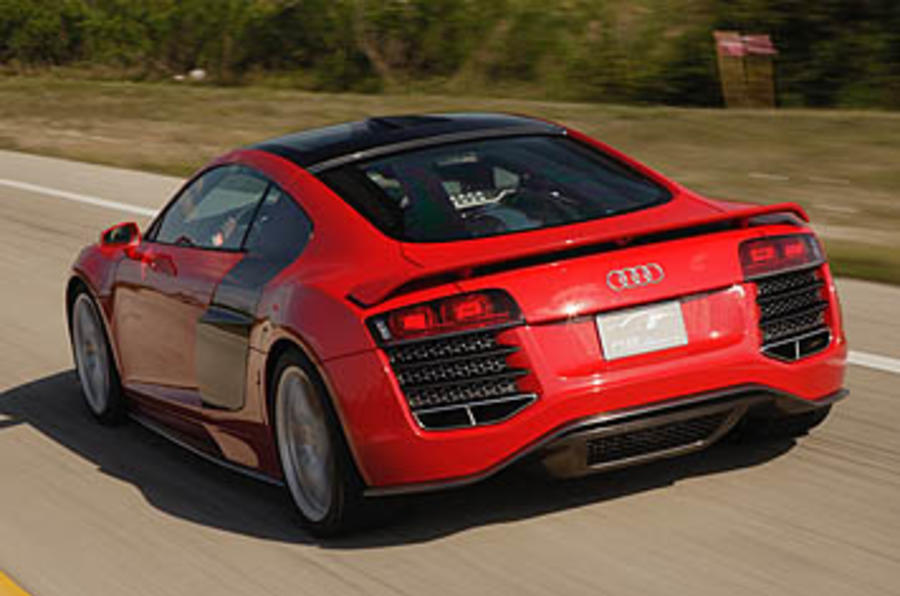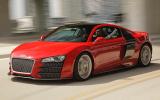What is it?
The Audi R8 V12 TDi Le Mans is the world's first diesel-powered supercar. At least that's what some are calling it. Audi is smart enough to call its new R8 V12 TDi a super-sports car, pitching it against the likes of the Ferrari F430 rather than full blown supercars of the Bugatti Veyron, Ferrari Enzo and McLaren F1 ilk.
But be in no doubt; this is a proper £100,000-plus exotic – and the first to drink from the dark side of the pump.
It's still a concept car for now, but only until the dust settles, the media monitoring results come in, and Audi's suspicions are confirmed. It's convinced, you see, that the time of the mid-engined, V12, diesel-powered, quattro-driven sports car has come. But for good reason? Read on...
What's it like?
Challenging. Different. Fascinating. And also genuinely quick, if lacking in a few of the other attractions you normally get with exotica like this.
The word is that Audi had several multi-million dollar offers for this concept car at the Detroit motor show, on the strength of its looks alone. That's probably because it's a devilishly purposeful-looking car.
In making it, the stylists substituted most of the standard R8's carbonfibre for aluminium, and added bumper- and sill-extensions in the same polished alloy, as well as a proper underbody air diffuser. The result looks threatening and aggressive, like the kind of car that devours roads, and whatever may be on them, without so much as a change of gear.
Which is exactly as it should be, since this particular R8 has the wherewithal to do exactly that. Powered by a Hungarian-built twin-turbodiesel V12 (the same, but for a dry sump, that you'll find in the new Q7 V12), this car will do 62mph in 4.2sec, 100mph in less than 10sec, and more than 190mph flat out.
More phenomenal than that is its in-gear pulling power, which is the truest measure of everyday performance on the road. 738lb ft is almost as much twist as a BMW M6 and a Ferrari F430 muster between them. In a car that should weigh just 150kg more than a V8-powered R8 in road-going guise, or about 1750kg. Doesn't take a genius to work out why Audi has been so excited about performance diesels, does it?
This car will also do an average 25mpg, of course, and emits about 250g/km of CO2 – which are figures usually associated with hot hatches, and never before with near-200mph supercars.
So does it feel as savagely fast as the figures suggest? Well, on the back of this test drive it's difficult to be definitive. Audi's test route was short, and its concern for the one working prototype of this car considerable. We weren't allowed to do more than 35mph, proper cornering was forbidden, and full bore starts were out too.
That effectively reduced us to a couple of runs around what amounted to little more than car park access roads. So I can report that this R8 appears to steer and ride much like a standard one (ie very nicely indeed). It's got Audi's excellent magnaride adjustable dampers, which add a couple of new dimensions to its ride and handling repertoire.
And yes, its certainly quick – quicker even than anybody really knows yet. I risked a knuckle-rapping by giving the car full throttle in 3rd, from 25mph and 1000rpm; it mugged the tarmac and began hurtling at the horizon with an urgency that made me painfully aware of the driver’s seat’s lumbar support. There was no wheelspin, no turbo lag. I only felt the full savagery for a couple of seconds, but that was enough to convince me that this car deserves a future in production.

























Join the debate
Add your comment
Re: Audi R8 V12 TDi Le Mans
I sometimes wonder why Autocar runs reports like this
OK a Diesel R8 WILL probably be impressive knowing AUDI but to build expectations based on a drive in a car under controlled (below 35mph) conditions with an engine marginal on cooling, running reduced power, with wrong gearbox, with a 2 inch reduction in legroom due to size of 300kg lump in back which could possibly/probably make handling "interesting" if it ever makes production is to me bad reporting
If some "Pimp my ride" outfit had hacked an R8 about in same manner it would be treated as a joke! not worth of consideration for magazine
Wait till AUDI put the V8 diesel in the back and productionise it then report it
Re: Audi R8 V12 TDi Le Mans
In the late 60s when catalysts where first introduced, manufactures moaned about the extra weight and complexity of all the exta equipment petrols needed. 40 odd years have have passed and no one moans about the extra weight and equipment they ve had to have for the last 4 decades (20 odd years in Europe) now. Dont forget petrols have THREE cats plus loads of complex sensors. Diesels have survived with virtually no emmissions equipment. Now they are having to be equiped with such devices, this simply brings them into line with petrols no more. Petrols also produce particulates albeit less than diesels, but the older they get the more particulate matter they produce, whereas diesels produce around the same levels throughout their life. However, direcct injection petrols produce a lot more particulates than indirect injection petrols and usage of these is increasing (VAG's T/FSI range for instance). There are no particulate filters for petrols at all. If you burn something, you get soot. And a typical moodern all aluminium 4 cylinder diesel is usually no more than 25kgs heavier than the equivalent sized petrol. I remember reading in Car last year that the BM 335D didnt handle quite as well as the 330i and that the extra weight in the nose could be felt. A simple check of the stats revealed that the 335i was actually 15 KG HEAVIER! A lot ot this anti diesel nonsense is psychological, its down to conditioning. 30 years ago they were slower noisier and heavier now things have changed but some peoples perceptions havent moved with the times. I cant wait for electric cars, theres nothing better for performance than maximum torque at zero revs, (and they ll be cleaner, even if they run off the mains and dont produce it themselves), but I m sure we ll have the same old people moaing about the lack of noise and going on about milk floats.
Re: Audi R8 V12 TDi Le Mans
Why do people still go on about the noise?-There are plenty of diesels out there that sound great, and not "despite" being diesels but BECAUSE they are diesels (BM's twin turbo for instance, volvo's 5 cyl, Fiat/Alfa/Lancia 5 cyl). And there are plenty of petrols that sound awful (Ford CVH, anything with a way oversized exhaust). Even VW's 4 cyl TDI can sound good, especially when its comming from a Fabia VRs or Ibiza Cupra driven in anger-theres something quite unexpected and cool about hearing such a beefy noise coming from a small car.